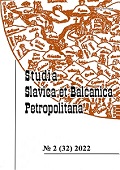Место Руси / России в эсхатологических концепциях в Московском государстве конца XVI – середины XVII века
The Place of Rus’ / Russia in the eschatological concepts in Muscovite state of the late 16th - mid 17th centuries
Author(s): Petr Sergeevich StefanovichSubject(s): History of ideas, Philosophy of Religion, 16th Century, 17th Century, Sociology of Religion, History of Religion, Identity of Collectives
Published by: Издательство Исторического факультета СПбГУ
Keywords: history of ideas; eschatology; Russian identity; Muscovite Tasardom;
Summary/Abstract: This article examines how eschatological ideas which circulated in the late 16th – mid 17th century Muscovite State, described the place of Rus’ / Russia in the world and in the world history. The starting point for the analysis is the model of the God-chosen exclusivity of the Muscovite tsardom, which is often called a special Muscovite mythology. Eschatological ideas, first of all, the idea of «Moscow— Third Rome», developed by the Pskov monk Philotheus in the 1520s, were a necessary element of this model, which created the image of «shining Russia» (or «holy Rus»), preserving the true faith up to the End of the world. In the first half of the 17th century, eschatological ideas described by Orthodox Ruthenian authors working in the Polish-Lithuanian Commonwealth began to be warmly received in the Muscovite State. Adaptions of their works appeared primarily in two anthologies of polemic writings published in Moscow — Cyril’s Book (1644) and The Book of Faith (1648). As this article demonstrates, the eschatological schemes featured in these texts envisaged Rus’ as a nation united by an ancient history and by true faith rather than by any political structures. At the same time, in the 1640s–1650s, prophecies of Greco-Byzantine origin popularised in Moscow assigned a key role to Russia in reviving the universal empire. These new concepts fundamentally diverged both from the idea of «Moscow—Third Rome» and from the entire Muscovite mythology of exceptionality. As the author concludes, the popularity of these ideas coincided with fundamental societal changes in Russia, marked by the incorporation of Ukraine in 1654 and the Church Schism.
Journal: Петербургские славянские и балканские исследования
- Issue Year: 2023
- Issue No: 2 (34)
- Page Range: 29-52
- Page Count: 24
- Language: Russian

